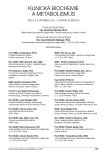-
Medical journals
- Career
How to increase the effectiveness of EHK programs for hormones
Authors: B. Friedecký 1,2
Authors‘ workplace: Ústav klinické biochemie a diagnostiky, Fakultní nemocnice Hradec Králové 1; SEKK s. r. o., Pardubice 2
Published in: Klin. Biochem. Metab., 29, 2021, No. 4, p. 216-219
Overview
Objective: Demonstration of low effectivity in programs EQA for hormone in serum and possibilities for its improvement.
Method: Minireview about possibilities of improving reference values for assessment of results, for bias determination and for kind of control materials.
Results: Missing standardization, harmonization and metrological traceability are resolved by using average values from individual methods like EQA reference target for assessment of laboratory results. There are frequently subdivided according to platforms and “generations” of the same producers. It leads to minimalization of validity in quality assessment and paradoxically to falsely high successfulness of labs in EQA. We briefly introduce possibilities of improvement of validity and effectiveness of hormone measurement by different ways. From mathematical recalibration to standardization by means of mass spectrometry methods.
Conclusion: Commutability of control materials and creating the reference systems based on mass spectrometry can resolve poor situation and increase effectiveness of ERQA programs for hormone.
Keywords: EQA, hormones, standardization and harmonization, commutability, effectiveness.
Keywords:
effectiveness – Hormones – EQA – standardization and harmonization – commutability
Sources
- Kristiansen, G. B., Rustad, P., Berg, J., Aakre, K. M., Analytical bias exceeding desirable quality goals in 4 out of 5 commonimmunoassays, Results of a native single serum sample external quality assessment program for cobalamine, folate, ferritin, thyroid stimulating hormone and free T4 analyses. Clin. Chem., 2016, 62(9), s. 1255-1263.
- Kristensen, G. B., Meijer, P., Interpretation of EQA results and EQA-based trouble shooting. Biochem. Med., 2017, 27(1), s. 49-62.
- Thienpont, L., Van Uytfange, K., De Grande, L. et al., Harmonization of serum Thyroid-Stimulating hormone measurements paves the way for the adoption of a more uniform reference interval. IFCC committee for standardization of thyroid function tests (C-STFT). Clin. Chem., 2017, 63(7), s. 1248-1260.
- Padoan, A., Clerico, A., Zanimotto, M. et al., Percentile transformation and recalibration function allow harmonization of TSH immunoassay results. Clin. Chem. Lab. Med., 2020, 58(10), s. 1663–1672.
- Stenman, U. H., Standardization of hormone determination. Best Pract. Res. Clin. Endocrinol. Metab., 2013, 27(6), s. 823-830.
- Soldin, O. P., Soldion, S. J., Thyroid hormone testing by tandem mass spectrometry. Clin Biochem 2011, 44(1), s. 89-94.
- Eisenhofer, G., Peitzsch, M., Kaden, D. et al., Refrerence intervals for plasma concentrations of adrenal steroids measured by LC-MS/MS. Impact of gender, age, oral contraceptives, body mass index and blood pressure status. Clin. Chim. Acta, 2017, 470, s. 115–124.
- Cavalier, E., Vasikaran, H., Bhattoa, H. et al., The path to the standardization of PTH: Is this a realistic possibility? A position paper on the IFCC-C-BM. Clin. Chim. Acta, 2021, 515, s. 44-51.
- Keteller, M., Black, G. A., Evenepoel, P. et al., Executive Summary of the 207 KDIGO Chronic Kidney Disease-Mineral Bone Disorder (CKD-MBD) Guidelines Update: What is Charged and why it matters. Kidney Int., 2017, 92(1), s. 26-36.
- Carobene, A., Aarsland, A. K., Barlett, W. A. et al., The european biological variation study (EuBIVAS): a summary report. Clin. Chem. Lab. Med., 2021, https://doi.org/10.1515/cclm-2021-0370.
- Bottani, M., Banfi, C., Guerra, E. et al., EuBIVAS study: within-and between - subject biological variation non-estimates for serum biointact parathyroid hormone. Ann. Trassl. Meds., 2020, 8, s. 855.
Labels
Clinical biochemistry Nuclear medicine Nutritive therapist
Article was published inClinical Biochemistry and Metabolism

2021 Issue 4-
All articles in this issue
- Monoklonální gamapatie – stále aktuální téma
- Pleural effusion – cytological-energy analysis versus traditional Light’s criteria
- Analysis of the more frequent occurrence of multiple myeloma in Eastern Bohemia
- Use of serum calprotectin as rutine biomarker of bacterial infection
- Urea cycle disorders, Arginine Chloride in the treatment of hyperammonemia
- Measurement and interpretation of cardiac troponins in Europe. Commentary on the studies CAMARGUE and SEKK 2019. Communication for practice.
- How to increase the effectiveness of EHK programs for hormones
- Clinical Biochemistry and Metabolism
- Journal archive
- Current issue
- Online only
- About the journal
Most read in this issue- Use of serum calprotectin as rutine biomarker of bacterial infection
- Urea cycle disorders, Arginine Chloride in the treatment of hyperammonemia
- Monoklonální gamapatie – stále aktuální téma
- Pleural effusion – cytological-energy analysis versus traditional Light’s criteria
Login#ADS_BOTTOM_SCRIPTS#Forgotten passwordEnter the email address that you registered with. We will send you instructions on how to set a new password.
- Career

